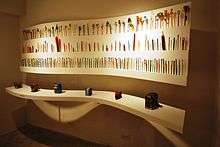Gonzalo Tassier
Gonzalo Tassier is a graphic designer and publicity specialist from Mexico City, who has created a number of highly recognized logos and trademarks in Mexico.[1] His was born in Mexico City in 1941. In his youth, he studied at the UNAM School of Architecture, then he studied philosophy for four years, before joining a religious community called the Missionaries of the Holy Spirit. However, as a designer, he is self-taught.[2]
His career has spanned over four decades to become of the most outstanding and pioneering graphic designers in Mexico.[2][3] He has worked for offices such as those of Giancarlo Novi, Design Center and Bozell.[3] Tassier’s best-known work includes the logo for PEMEX (created with Francisco Teuscher), the trademarks for Del Fuerte and Aguigol and the eagle which has been used for the Mexico national football team since 1998.[1][4] He has also designed brochures for Ford and Wyeth, audiovisual work for IMSS and book covers for the Demac publishing company.[4]

In 1995, Tassier founded his own agency called Retorno Tassier, dedicated to graphic design, publishing and general publicity, located in Mexico City.[4][5] The agency works with numerous Mexican and international companies along with governmental agencies and other organizations.[2] The firm also does work for a number of non profit organizations as a social service.[5] Clients include Santander Group, Volkswagen of Mexico and the United Nations Industrial Development Organization.[4]
Tassier remains with his agency as president.[2] Another independent firm Tassier created with partner Bruno Newman is La Gunilla Editores, a publishing house whose books focus on design and collecting. The name is a play on "Lagunilla", a community which has a famous market for collectors.[6]
In 2002, he received honors from the Quórum organization, which also published a book about his career.[3]
Tassier is a professor of design at the Universidad Iberoamericana, and is considered to be one of the most respected teachers of this field in the country.[2][4] He teaching work led to the Sir Misha Black Medal.[7] in London in 2008, after being nominated by a group of his students. He is the first Latin American to receive the prize in thirty years.[4]
His style is considered to be original and sensitive as well as methodical and perfectionist.[2] Tassier believes that laughter is an fundamental ingredient in promotion, that good commercials will evoke a smile and positive emotion.[8]
The Museo del Objeto del Objeto held an exhibition of Tassier’s work in October 2011, as part of the “El MODO de ….” (The Manner of...) series.[1][3] In addition to drawings and design, the exhibit also included Tassier’s pencil collection, which has over 11,000 pieces.[1] The pencil collection represents the importance that the implement has for his work.[3]
References
- 1 2 3 4 Ortega García, Tania (February 10, 2011). "Gonzalo Tassier, diseñando el objeto del objeto" [Gonzalo Tassier, designing the object of the object]. Mil Mesetas (in Spanish). Retrieved November 11, 2011.
- 1 2 3 4 5 6 "2008 Medal Professor Gonzalo Tassier". London: Misha Black Awards. Retrieved November 11, 2011.
- 1 2 3 4 5 "El Modo de Tassier. Trazo, dibujo y diseño" [The Mode of Tassier, layout, drawing and design] (in Spanish). Mexico City: Museo del Objeto del Objeto. September 26, 2011. Retrieved November 11, 2011.
- 1 2 3 4 5 6 "Gonzalo Tassier recibe premio en Londres" [Gonzalo Tassier receives award in London]. CNN Expansión (in Spanish). March 5, 2009. Retrieved November 11, 2011.
- 1 2 "Historia" [History] (in Spanish). Mexico City: Retorno Tassier. Retrieved November 11, 2011.
- ↑ "La ciudad como galería" [The city as gallery]. Milenio (in Spanish). Mexico City. August 14, 2010. Retrieved November 11, 2011.
- ↑ "The Sir Misha Black Medal | Misha Black Awards". mishablackawards.org.uk. Retrieved 2015-06-25.
- ↑ Guzmán, Ricardo (July 10, 2005). "El humor en la publicidad" [Humor in publicity]. La Jornada Semanal (in Spanish). Retrieved November 11, 2011.